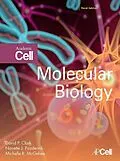Molecular Biology, Third Edition, provides a thoroughly revised, invaluable resource for college and university students in the life sciences, medicine and related fields. This esteemed text continues to meet the needs of students and professors by offering new chapters on RNA, genome defense, and epigenetics, along with expanded coverage of RNAi, CRISPR, and more ensuring topical content for a new class of students. This volume effectively introduces basic concepts that are followed by more specific applications as the text evolves.Moreover, as part of the Academic Cell line of textbooks, this book contains research passages that shine a spotlight on current experimental work reported in Cell Press articles. These articles form the basis of case studies found in the associated online study guide that is designed to tie current topics to the scientific community. - Winner of a 2020 Textbook Excellence Award (College) (Texty) from the Textbook and Academic Authors Association - Contains new chapters on non-coding RNA, genome defense, epigenetics and epigenomics - Features new and expanded coverage of RNAi, CRISPR, genome editing, giant viruses and proteomics - Provides an ancillary package with updated PowerPoint slide images
Autorentext
David P. Clark did his graduate work on bacterial antibiotic resistance to earn his Ph.D. from Bristol University, in the West of England. During this time, he visited the British Government's biological warfare facility at Porton Down and was privileged to walk inside the (disused) Black Death fermenter. He later crossed the Atlantic to work as a postdoctoral researcher at Yale University and then the University of Illinois. David Clark recently retired from teaching Molecular Biology and Bacterial Physiology at Southern Illinois University which he joined in 1981. His research into the Regulation of Alcohol Fermentation in E. coli was funded by the U.S. Department of Energy, from 1982 till 2007. From 1984-1991 he was also involved in a project to use genetically altered bacteria to remove contaminating sulfur from coal, jointly funded by the US Department of Energy and the Illinois Coal Development Board. In 1991 he received a Royal Society Guest Research Fellowship to work at Sheffield University, England while on sabbatical leave. He has supervised 11 master's and 7 PhD students and published approximately 70 articles in scientific journals. He has written or co-authored several textbooks, starting with Molecular Biology Made Simple and Fun (with Lonnie Russell; (Cache River Press, First edition, 1997) which is now in its fourth edition. Other books are Molecular Biology and Biotechnology (both published by Elsevier) He recently wrote a popular science book, Germs, Genes, & Civilization: How Epidemics Shaped Who We Are Today (2010, Financial Times Press/Pearson). David is unmarried, but his life is supervised by two cats, Little George and Mr Ralph.
Klappentext
Molecular Biology, Third Edition, provides a thoroughly revised, invaluable resource for college and university students in the life sciences, medicine and related fields. This esteemed text continues to meet the needs of students and professors by offering new chapters on RNA, genome defense, and epigenetics, along with expanded coverage of RNAi, CRISPR, and more ensuring topical content for a new class of students. This volume effectively introduces basic concepts that are followed by more specific applications as the text evolves.
Moreover, as part of the Academic Cell line of textbooks, this book contains research passages that shine a spotlight on current experimental work reported in Cell Press articles. These articles form the basis of case studies found in the associated online study guide that is designed to tie current topics to the scientific community.
- Winner of a 2020 Textbook Excellence Award (College) (Texty) from the Textbook and Academic Authors Association
- Contains new chapters on non-coding RNA, genome defense, epigenetics and epigenomics
- Features new and expanded coverage of RNAi, CRISPR, genome editing, giant viruses and proteomics
- Provides an ancillary package with access to previous edition flashcards and online self-quizzing as well as updated PowerPoint slides with images
Inhalt
Unit 1: Basic Chemical and Biological Principles 1. Cells and Organisms 2. Basic Genetics 3. DNA, RNA, and Protein 4. Genes, Genomes, and DNA 5. Manipulation of Nucleic Acids
Unit 2: The Genome 6. The Polymerase Chain Reaction 7. Cloning Genes for Analysis 8. DNA Sequencing 9. Genomics and Systems Biology New Chapter to cover metagenomics, symbiosis, epigenomics etc
Unit 3: The Central Dogma of Molecular Biology 10. Cell Division and DNA Replication 11. Transcription of Genes 12. Processing of RNA (moved to Unit 4) 13. Protein Synthesis 14. Protein Structure and Function 15. Proteomics: Global Analysis of Proteins
Unit 4: Regulating Gene Expression 16. Regulation of Transcription in Prokaryotes 17. Regulation of Transcription in Eukaryotes 12. Processing of RNA (moved from Unit 3) 18. Regulation at the RNA Level New Chapter on Genome defense (RNAi and CRISPR). Would include their use in genetic analysis and genome editing 19. Analysis of Gene Expression (Transcriptome)
Unit 5: Subcellular Life Forms 20. Plasmids 21. Viruses 22. Mobile DNA
Unit 6: Changing the DNA Blueprint 23. Mutations and Repair 24. Recombination 25. Bacterial Genetics 26. Molecular Evolution
